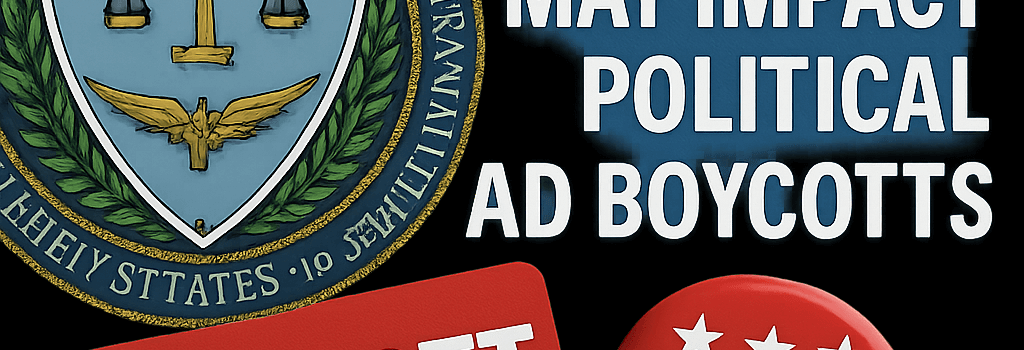FTC’s Merger Condition May Impact Political Ad Boycotts

The Federal Trade Commission (FTC) is considering a consent decree for the proposed merger between ad giants Omnicom Group and Interpublic Group that would forbid the merged entity from coordinating advertising boycotts based on political content. The move, first reported by The New York Times, could have significant implications for platforms like Elon Musk’s X and former President Trump’s Truth Social.
Background on the Omnicom-Interpublic Merger
Omnicom Group and Interpublic Group, two of the largest global advertising holding companies with combined revenues exceeding $35 billion, announced their intent to merge in early 2025. The merger aims to consolidate their programmatic advertising stacks, data analytics divisions, and client portfolios, leveraging advanced AI-driven campaign optimization and cloud-hosted ad-tech platforms.
- Programmatic Infrastructure: Both firms operate proprietary Demand-Side Platforms (DSPs) and integrate with multiple Supply-Side Platforms (SSPs) via real-time bidding (RTB) protocols.
- Data Management Platforms (DMPs): They deploy large-scale DMPs that ingest first- and third-party data from social media, web analytics, and CRM systems to build audience segments.
- Cloud Services: Their ad-tech stacks run on hybrid multicloud environments, leveraging AWS and Google Cloud for scalable compute and storage of petabyte-scale ad impressions and clickstream logs.
Key Provisions of the Proposed Consent Decree
The FTC’s draft condition would explicitly prohibit the merged agency from collectively refusing to place advertisements on any digital platform due to its political content. The decree could include the following:
- A prohibition on concerted refusals to deal with platforms such as X or Truth Social.
- Regular compliance reporting to the FTC, including logs of ad placements, client instructions, and political screening criteria.
- Annual third-party audits to verify no collusion on ad spending based on political ideologies.
FTC’s Enforcement Actions and Political Context
Under Chairman Andrew Ferguson, the Commission—now comprised entirely of Republican-appointed commissioners after two Democratic commissioners were removed—has ramped up scrutiny of ad boycotts. Ferguson has characterized coordinated advertiser boycotts as potential “concerted refusals to deal” prohibited by Section 1 of the Sherman Act when executed by firms with substantial market power.
Civil Investigations and Subpoenas
In May 2025, the FTC issued civil investigative demands to Omnicom, Interpublic, and other major agencies to gather documents on whether they coordinated boycotts of X. The Agency also targeted Media Matters and the World Federation of Advertisers (WFA), probing potential collusion in ad-withholding campaigns that X alleges deprived it of over $1 billion in advertising revenue.
“If advertisers get into a back room and agree, ‘We aren’t going to put our stuff next to this content,’ that is a form of concerted refusal to deal,” FTC Chairman Andrew Ferguson said at an April conference.
Congressional and Legal Challenges
Senate Democrats have raised concerns in letters to the FTC and the Department of Justice, suggesting that Musk leveraged his brief role as a special government employee to influence merger outcomes. They cite reports that X’s CEO—former Pepsi executive Linda Yaccarino—warned Interpublic officials that failure to increase ad spend on X could threaten merger approval.
Technical Impact on Programmatic Advertising Infrastructure
If enacted, the anti-boycott condition would reshape how agencies configure their programmatic bidding algorithms and brand safety filters:
- Agencies would need to decouple political content flags from automated blocklists in Demand-Side Platforms.
- Real-time bidding engines must adopt neutral scoring for ad auctions, ignoring user-generated political tags to comply with the decree.
- Data pipelines ingesting content metadata would require auditing to ensure no discriminatory filters against platforms hosting political speech.
Cloud architects may have to redesign microservices in containerized environments (e.g., Kubernetes clusters) to enforce these changes without disrupting low-latency bid responses.
Data Privacy and Security Considerations
The FTC’s condition raises questions on how agencies handle PII and user preferences in politically sensitive contexts. Strict firewall rules and identity management protocols (e.g., OAuth 2.0, JWT) will be essential to:
- Prevent unauthorized access to political content flags in data management platforms.
- Ensure compliance with GDPR and CCPA when processing EU and California user data, especially if auditors inspect platform allocations by political topic.
- Maintain end-to-end encryption for ad request and delivery logs to preserve client confidentiality during FTC reviews.
Future Outlook: Ad Tech Ecosystem and Antitrust Risks
Industry experts predict that this development could trigger a wave of similar conditions in future ad-tech consolidations. As AI-driven personalization and contextual targeting become more prevalent, regulators may scrutinize algorithmic bias and platform access:
- Algorithmic Audits: Independent third parties could be mandated to review ML models for fairness and neutrality across political content categories.
- Interoperability Standards: The adoption of OpenRTB and emerging APIs like Open Pixel may be encouraged to prevent lock-in and ensure equal market access.
Expert Opinions
“This is a pivotal moment for ad tech,” said Dr. Alicia Martinez, a digital advertising researcher at MIT. “Regulators are finally catching up with the complexity of programmatic markets. Mandating neutrality at the platform level may serve free speech, but it also poses technical integration challenges.”
John Kim, CTO of a mid-size agency, added: “We’ll need to overhaul our AWS Lambda functions and Kafka streaming jobs to strip out any political bias tags before bidding. It’s doable, but not trivial.”